ABOUT ME
I’m Rishin Fathima, a passionate digital marketer located in Calicut. With skills in SEO, PPC advertising, social media marketing, and analytics, I enjoy developing data-driven strategies that increase brand visibility and create tangible business results.
My journey was inspired by an intense interest in digital improvements and a desire to innovate in marketing strategies. With producing verifiable outcomes, I focus developing collaborative connections with customers to provide specific remedies that meet their objectives. Let’s work together to grow your digital footprint and achieve long-term success in the modern marketplace.

MY DIGITAL MARKETING SERVICES
SMM
"Boost engagement and brand visibility with our strategic Social Media Marketing (SMM) services. Harness the power of platforms like Facebook, Instagram, and LinkedIn to drive growth and connect with your audience effectively."
SEO
"Boost your online presence with our expert SEO services. Improve search engine rankings, drive organic traffic, and grow your business. Tailored strategies for optimal results. Contact us today for a free consultation!"
SEM
Enhance your online visibility with our expert SEO services. Improve your website's ranking on search engines, drive organic traffic, and boost your business growth with tailored strategies and proven techniques.
WEB DEVELOPMENT
"Elevate your digital presence with bespoke web solutions. From responsive design to seamless functionality, we craft websites that captivate audiences and drive results. Let's build your online success story together."
CONTENT MARKETING
"Harness the art of storytelling and strategic distribution to captivate your audience. Our tailored content marketing solutions drive engagement, build authority, and amplify your brand's reach across digital channels."
EMAIL MARKETING
"Elevate your outreach with targeted email campaigns that captivate and convert. Harness the power of personalized messaging and analytics to drive engagement and ROI effortlessly."
WHY DIGITAL MARKETING
“Digital marketing is the comprehensive strategy and implementation of marketing efforts across digital channels to connect with current and prospective customers. It encompasses a range of online tactics, including search engine optimization (SEO), pay-per-click advertising (PPC), social media marketing, email campaigns, content creation, and more. By leveraging these channels effectively, businesses can enhance brand visibility, attract targeted traffic, generate leads, and ultimately drive sales. Digital marketing strategies are data-driven, allowing for precise targeting based on demographics, interests, and behaviors. This approach not only optimizes return on investment (ROI) but also fosters meaningful customer relationships and supports business growth in today’s competitive digital landscape.”
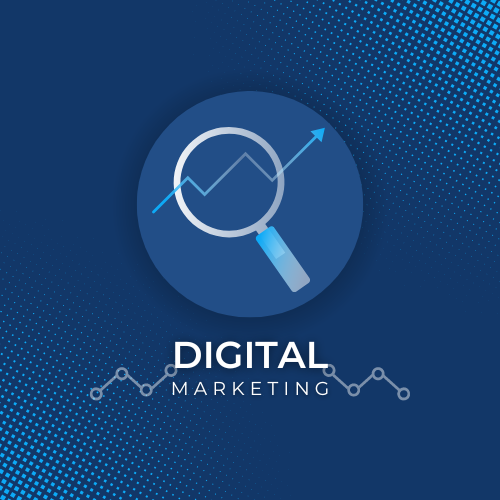
CERTIFICATIONS
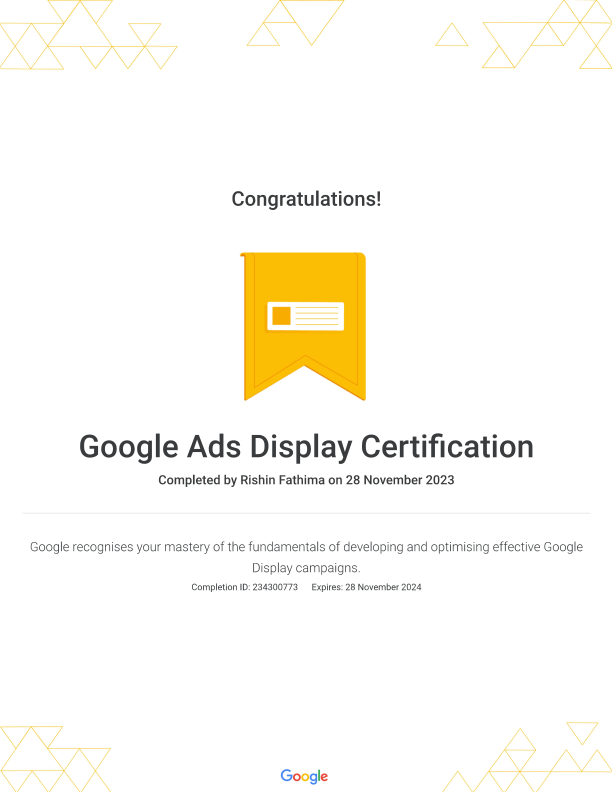
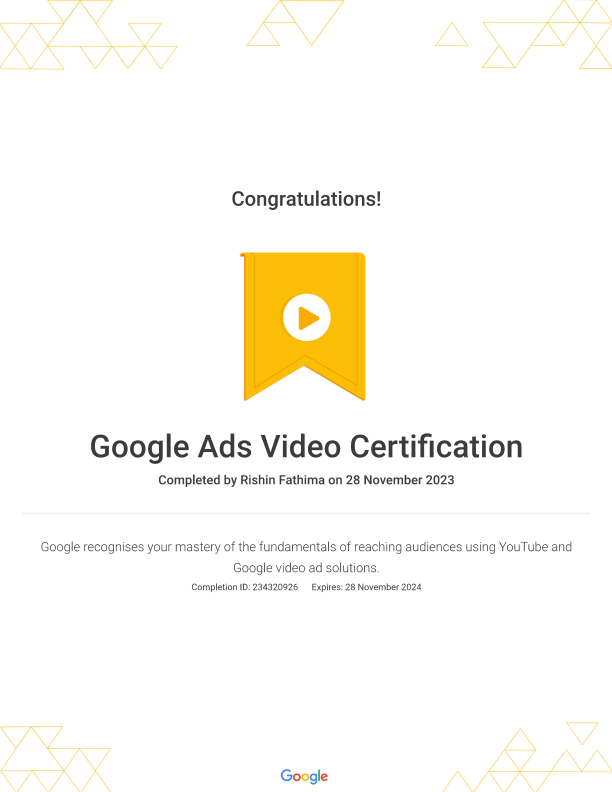
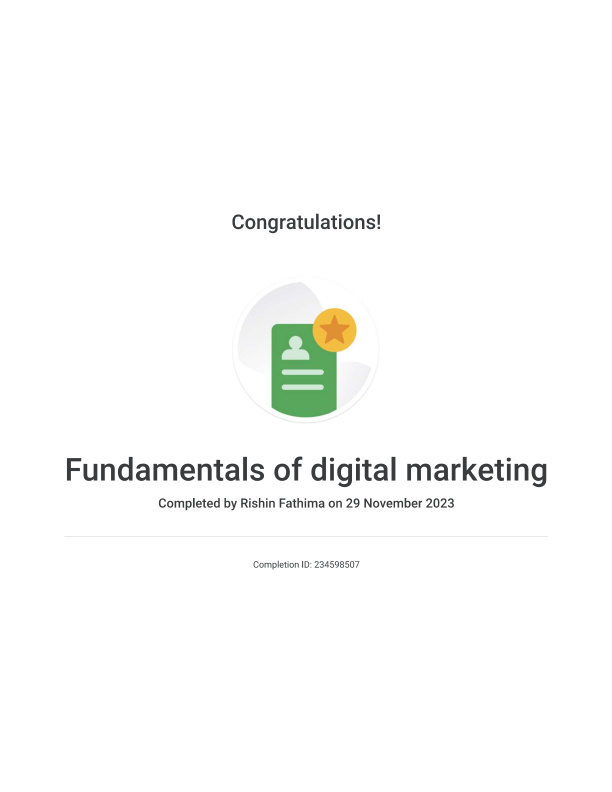
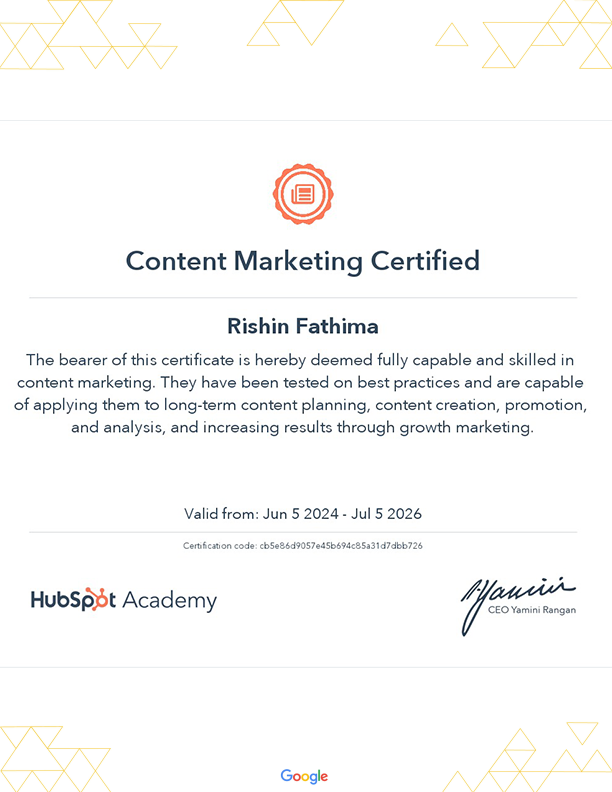
FAQ
Digital marketing is the practice of promoting products or services using digital channels and technologies. This includes a range of strategies and techniques, such as:
- Search Engine Optimization (SEO): Improving website visibility in search engine results.
- Search Engine Marketing (SEM): Using paid advertising to appear in search engine results.
- Content Marketing: Creating and distributing valuable content to attract and engage an audience.
- Social Media Marketing: Using social media platforms to promote products, services, and brand awareness.
- Email Marketing: Sending targeted emails to prospects and customers.
- Pay-Per-Click Advertising (PPC): Paying for ads that appear on search engines or websites.
- Affiliate Marketing: Partnering with other businesses or influencers to promote products.
- Online Public Relations: Managing a brand’s online presence and reputation.
- Analytics: Using data to track and measure the effectiveness of marketing efforts.
Digital marketing allows businesses to reach a global audience, engage with customers in real-time, and measure the success of their campaigns with precision.
Digital Marketing:
- Targeted Audience: Digital marketing allows for precise audience targeting based on demographics, interests, and behaviors, ensuring your message reaches the right people.
- Cost-Effective: Generally more affordable than traditional methods, with options for any budget. Small businesses can compete with larger companies.
- Measurable Results: Advanced analytics and tracking tools provide real-time data on campaign performance, enabling continuous optimization.
- Global Reach: The internet provides access to a global audience, expanding your market potential.
- Interactive Engagement: Digital channels enable direct interaction with customers through comments, likes, shares, and messages, fostering stronger relationships.
- Quick Adjustments: Campaigns can be modified quickly in response to performance data or market changes.
Traditional Marketing:
- High Costs: Traditional marketing methods like TV, radio, and print ads can be very expensive, making them less accessible for small businesses.
- Limited Targeting: Audience targeting is less precise, often reaching a broader but less relevant audience.
- Difficult to Measure: Measuring the effectiveness of traditional marketing campaigns can be challenging and less accurate.
- Limited Engagement: Traditional marketing is generally one-way communication, with limited opportunities for audience interaction.
- Slower Adjustments: Changes to campaigns are more difficult and time-consuming, often requiring significant resources and planning.
As a digital marketer, I can help your business grow and succeed in the online space through a variety of strategies and services:
Increase Online Visibility:
- SEO (Search Engine Optimization): Improve your website’s ranking on search engines to drive organic traffic.
- Content Marketing: Create and distribute valuable content to attract and engage your target audience.
Drive Targeted Traffic:
- PPC Advertising: Use pay-per-click ads on platforms like Google and social media to attract relevant visitors.
- Social Media Marketing: Promote your brand and engage with customers on platforms like Facebook, Instagram, LinkedIn, and Twitter.
Enhance Customer Engagement:
- Social Media Management: Build and maintain a strong social media presence, interact with your audience, and manage your online reputation.
- Email Marketing: Develop personalized email campaigns to nurture leads and retain customers.
Boost Conversions and Sales:
- Conversion Rate Optimization (CRO): Optimize your website and landing pages to increase the percentage of visitors who take desired actions, such as making a purchase or filling out a contact form.
- Retargeting Campaigns: Re-engage visitors who have shown interest in your products but haven’t yet converted.
Analyze and Optimize:
- Analytics and Reporting: Track and analyze the performance of your digital marketing efforts using tools like Google Analytics. Provide detailed reports and insights to help you make data-driven decisions.
- Continuous Improvement: Regularly assess and refine your strategies to ensure optimal performance and ROI.
Build Brand Awareness:
- Content Creation: Develop high-quality content that showcases your expertise and builds trust with your audience.
- Influencer Marketing: Partner with industry influencers to reach a broader audience and enhance your brand’s credibility.
Personalized Marketing Strategies:
- Tailored Campaigns: Create customized marketing strategies that align with your business goals, target audience, and industry.
- Customer Segmentation: Segment your audience to deliver personalized and relevant messages.
Manage Online Reputation:
- Online Reviews: Monitor and respond to customer reviews on platforms like Google My Business, Yelp, and social media.
- Crisis Management: Handle negative feedback and manage crises to protect your brand’s reputation.
By leveraging these digital marketing services, I can help your business reach a wider audience, engage with potential customers, and ultimately drive more sales and revenue. Let’s work together to achieve your business goals and build a strong online presence.
To increase sales through digital marketing, you can implement several strategies and best practices. Here are some key steps to help you boost your sales:
Understand Your Audience:
- Conduct market research to understand your target audience’s needs, preferences, and behaviors.
- Create detailed buyer personas to guide your marketing efforts.
Optimize Your Website:
- Ensure your website is user-friendly, mobile-responsive, and fast-loading.
- Use clear calls-to-action (CTAs) to guide visitors towards making a purchase.
- Implement SEO best practices to improve your search engine rankings and drive organic traffic.
Content Marketing:
- Create valuable, informative, and engaging content that addresses your audience’s pain points.
- Use blog posts, videos, infographics, and eBooks to attract and educate potential customers.
- Share your content on social media and through email marketing to reach a wider audience.
Social Media Marketing:
- Use social media platforms to connect with your audience, build brand awareness, and promote your products or services.
- Engage with your followers by responding to comments, messages, and mentions.
- Run targeted social media ads to reach specific segments of your audience.
Email Marketing:
- Build an email list by offering valuable incentives such as discounts, free resources, or exclusive content.
- Segment your email list to send personalized and relevant messages to different audience segments.
- Use email marketing to nurture leads, promote new products, and offer special deals.
Search Engine Marketing (SEM):
- Use pay-per-click (PPC) advertising on search engines like Google to drive targeted traffic to your website.
- Create compelling ad copy and use relevant keywords to attract potential customers.
- Monitor and optimize your campaigns to improve performance and ROI.
Retargeting Campaigns:
- Implement retargeting ads to re-engage visitors who have shown interest in your products but haven’t made a purchase.
- Use dynamic retargeting to show personalized ads based on the products they viewed on your website.
Leverage Influencer Marketing:
- Partner with influencers in your industry to promote your products to their followers.
- Choose influencers whose audience aligns with your target market for maximum impact.
Offer Promotions and Discounts:
- Run limited-time offers, discounts, and promotions to incentivize purchases.
- Use urgency and scarcity tactics to encourage quick decision-making.
Analyze and Optimize:
- Use analytics tools to track the performance of your digital marketing efforts.
- Analyze key metrics such as conversion rates, traffic sources, and customer behavior.
- Continuously optimize your strategies based on data and feedback to improve results.
Social media marketing is the process of using social media platforms to promote your business, products, or services. This involves creating and sharing content on social media networks to achieve your marketing and branding goals. Here’s how it works:
Content Creation: Develop engaging and relevant content, such as posts, images, videos, and stories, tailored to your target audience.
Platform Selection: Utilize popular social media platforms like Facebook, Instagram, Twitter, LinkedIn, Pinterest, and TikTok based on where your audience is most active.
Audience Engagement: Interact with your followers by responding to comments, messages, and mentions to build a community around your brand.
Advertising: Use paid social media ads to reach a broader audience and target specific demographics, interests, and behaviors.
Analytics: Track and analyze the performance of your social media campaigns using analytics tools to understand what works and what doesn’t.
Brand Awareness: Increase your brand’s visibility and recognition by consistently posting and engaging with your audience.
Lead Generation: Drive traffic to your website, generate leads, and increase conversions through strategic social media activities.
Social media marketing helps businesses connect with their audience, boost brand awareness, and ultimately drive sales. By leveraging the power of social media, you can build strong relationships with your customers and stay ahead of your competition.
Search Engine Optimization (SEO) is the process of optimizing your website to increase its visibility in organic (non-paid) search engine results. Here’s how it works:
Organic Traffic: SEO focuses on improving your website’s ranking in search engine results pages (SERPs) for relevant keywords and phrases that potential customers are searching for.
On-Page SEO: This involves optimizing elements on your website itself, such as content, HTML tags (title tags, meta descriptions), internal links, and website structure. It ensures that search engines can crawl and index your site effectively.
Off-Page SEO: Refers to activities done outside your website to improve its ranking. This includes building backlinks from reputable sites, social media promotion, and influencer outreach.
Keyword Research: Identifying the most relevant keywords and phrases that your target audience uses when searching for products or services similar to yours.
Content Optimization: Creating high-quality, informative content that incorporates targeted keywords naturally. This helps attract and engage visitors while satisfying search engine algorithms.
Technical SEO: Optimizing technical aspects of your website such as site speed, mobile-friendliness, secure HTTPS connections, and structured data markup to enhance user experience and search engine crawlers’ efficiency.
Analytics and Monitoring: Using tools like Google Analytics to track key metrics such as organic traffic, keyword rankings, and conversion rates. This data helps measure the effectiveness of your SEO efforts and informs future strategies.
Continuous Improvement: SEO is an ongoing process of testing, measuring, and refining strategies based on performance data and changes in search engine algorithms.
Effective SEO practices can help your website rank higher in search results, attract more qualified traffic, and ultimately drive conversions and revenue for your business.
Pay-Per-Click (PPC) Advertising: Ads are displayed above or below organic search results, and advertisers pay a fee each time a user clicks on their ad.
Keyword Targeting: Selecting relevant keywords that potential customers are likely to search for when looking for products or services similar to yours.
Ad Creation: Crafting compelling ad copy that attracts clicks and drives traffic to your website. Ads often include headlines, descriptions, and links to relevant landing pages.
Campaign Management: Monitoring and adjusting campaigns to optimize performance. This includes adjusting bids, refining targeting options, and testing different ad variations.
Performance Tracking: Using analytics tools to measure key metrics such as click-through rates (CTR), conversion rates, and return on investment (ROI).
SEM is effective for businesses looking to reach a targeted audience actively searching for specific products or services. It provides immediate visibility and can complement other digital marketing strategies like SEO (Search Engine Optimization) to enhance overall online presence and drive quality traffic to your website.
Web development in WordPress involves creating or customizing websites using the WordPress content management system (CMS). Here’s what it entails:
Content Management System (CMS): WordPress is a popular CMS that allows you to easily create, manage, and update website content, such as pages, posts, images, and videos.
Customization: Developers can customize WordPress themes and plugins to tailor the website’s design and functionality to specific business needs and branding requirements.
Responsive Design: Websites built with WordPress are responsive, meaning they adapt and display properly on various devices, including desktops, tablets, and smartphones.
SEO-Friendly: WordPress websites are inherently SEO-friendly, with features that help optimize content for search engines, such as clean code, customizable permalinks, and SEO plugins.
E-Commerce Capabilities: Using plugins like WooCommerce, developers can integrate e-commerce functionalities into WordPress websites, allowing businesses to sell products and services online.
Security: WordPress offers various security features and plugins to protect websites from threats and vulnerabilities, ensuring data and user information remain secure.
Scalability: WordPress websites can scale as businesses grow, accommodating increased traffic, content, and functionality with ease.
Maintenance and Support: Developers provide ongoing maintenance, updates, and support to ensure the website remains secure, functional, and up-to-date with the latest WordPress versions and best practices.
WordPress web development is ideal for businesses and individuals looking to create professional, scalable, and user-friendly websites without extensive technical knowledge. It empowers businesses to establish a robust online presence and effectively engage with their audience.
Content marketing is a strategic marketing approach focused on creating and distributing valuable, relevant, and consistent content to attract and retain a clearly defined audience. Here’s how it works:
Audience-Centric: Content marketing revolves around understanding your target audience’s needs, interests, and challenges. It aims to provide them with helpful and informative content that addresses their pain points.
Types of Content: Content can include blog posts, articles, videos, infographics, podcasts, eBooks, case studies, and more. The goal is to deliver content in various formats that resonate with your audience.
Building Authority: By consistently producing high-quality content that educates and entertains your audience, you establish yourself or your brand as an authority in your industry or niche.
SEO Benefits: Well-crafted content can improve your search engine rankings by incorporating relevant keywords and attracting inbound links from other websites.
Lead Generation: Content marketing can generate leads by offering valuable resources or gated content (e.g., eBooks or whitepapers) in exchange for contact information.
Relationship Building: Content helps foster trust and build relationships with your audience. Engaging with your audience through comments, shares, and discussions can further strengthen these connections.
Measurable Results: Content marketing efforts can be tracked and analyzed using metrics such as website traffic, engagement rates, conversion rates, and social media shares.
Content marketing is a long-term strategy that focuses on creating valuable connections with your audience, driving customer loyalty, and ultimately, driving profitable customer action.
Email marketing is a digital marketing strategy that involves sending targeted emails to prospects and customers to promote products, services, or events. Here’s how it works:
Audience Segmentation: Email marketing allows you to segment your audience based on demographics, behaviors, or past interactions. This enables you to send personalized and relevant content to different groups of subscribers.
Types of Emails: Common types of emails include newsletters, promotional offers, product updates, event invitations, and personalized follow-ups based on user actions (e.g., abandoned cart emails).
Automation: Utilizing email automation tools, you can set up workflows and sequences that automatically send emails based on triggers, such as subscriber sign-up, birthdays, or specific actions taken on your website.
Lead Nurturing: Email marketing is effective for nurturing leads through the sales funnel by providing valuable content, addressing customer concerns, and building trust over time.
Measurable Results: Email marketing platforms provide metrics such as open rates, click-through rates, conversion rates, and subscriber retention. These insights help you analyze the effectiveness of your campaigns and make data-driven decisions.
Compliance: Following email marketing best practices and adhering to regulations such as GDPR (General Data Protection Regulation) ensures that you maintain trust with subscribers and comply with legal requirements.
Integration: Email marketing integrates with other digital marketing channels, such as social media and content marketing, to create cohesive and comprehensive campaigns that enhance overall engagement and conversions.
Email marketing remains one of the most cost-effective and direct ways to communicate with your audience, build relationships, and drive sales for your business.